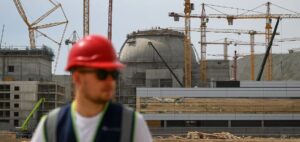The European Commission has unveiled a support programme in Kyiv aimed at securing Ukraine’s energy infrastructure and facilitating its integration into the European energy market. This initiative plans for the full connection of Ukraine’s electricity market with that of the European Union (EU) by 2027, alongside Moldova. It also includes deeper integration of Ukraine into the European gas market, provided the country accelerates energy sector reforms. These reforms, already outlined in the Ukraine Plan and the Energy Community, must include the establishment of support mechanisms for vulnerable households.
Strengthening energy security
The EU will assist Ukraine in purchasing gas to ensure sufficient reserves and stabilise energy supplies, benefiting both the country and the wider region. Additionally, the programme will accelerate the development of renewable energy, targeting an increase of 1.5 GW in generation capacity, equivalent to approximately 25% of Ukraine’s current renewable energy production. These investments will be financed through the Ukraine Facility, a dedicated European financial support mechanism.
For the past three years, Ukraine has faced repeated attacks on its energy infrastructure, resulting in the destruction of nearly half of its production capacity. Integration into the European market is seen as a key factor in securing the country’s energy independence and attracting essential investment for reconstruction.
A reinforced European commitment
Ursula von der Leyen, President of the European Commission, emphasised the importance of this initiative: “For three years, Russia has sought to plunge Ukraine into darkness by relentlessly targeting its energy infrastructure. This needs to stop for good. With this package, Europe guarantees Ukraine a resilient, secure, and competitive energy system. Full energy market integration and renewable energy expansion will enhance energy security for both Ukraine and the European Union.”
This plan builds on the €2bn already provided by the EU over the past three years. These funds have been allocated through the Ukraine Energy Support Fund, the Union Civil Protection Mechanism, and humanitarian aid, as well as proceeds from frozen Russian assets. The EU has also contributed to restoring 1.8 GW of electricity capacity and developing renewable energy projects, such as the “Ray of Hope” programme, which facilitates the installation of solar panels in Ukrainian hospitals.





















